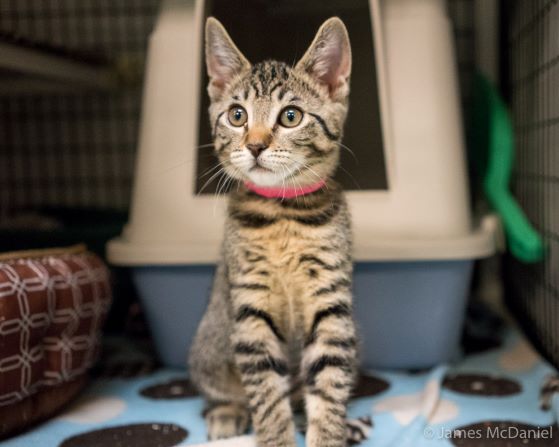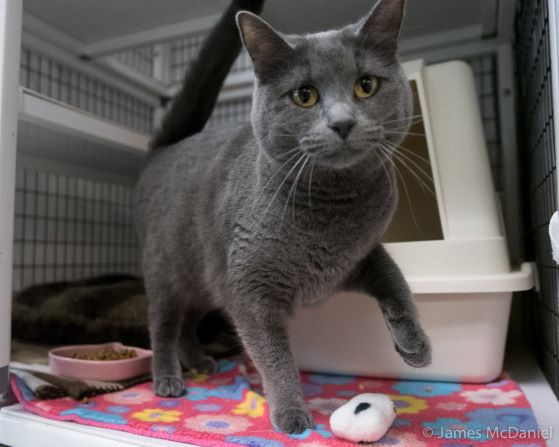Inappropriate Urination: Causes and Cures
One of the most common reasons that cats are relinquished to shelters is poor litter box behavior. This is a complicated issue, requiring a determined effort on the part of the cat’s guardian. Perhaps the most important recommendation is to address the issue right away and not wait until the problem worsens. The following are some tips, ideas and recommendations, should this ever happen in your home.
Causes
Feline Lower Urinary Tract Disease (FLUTD) – This is a common cause of a lapse in litter box manners. The only way kitty can express his/her discomfort is to urinate in unusual places. It is also thought that the cat may associate pain with the litter box and therefore choose a new place to eliminate. There are two symptoms usually associated with FLUTD, though not always together:
- Urinary Tract Infections (UTI) – Like people, cats can get bacteria buildup causing an infection in their urinary tract that can make urination very painful.
- Crystals – This often accompanies a UTI. There are two types of crystals, Struvite and Oxalate. When the pH in the urine becomes either too high or too low (a pH of approximately 6.5 is a normal), these microscopic crystals can develop in the bladder. As they pass through the urethra, they actually slice the tissue, causing blood in the urine as well as allowing infection to begin.
Stress – Can be caused by changes such as a new baby, a new partner, moving into a home where pets have lived previously. Factors like too many cats, anxiety about being left alone too much, a noisy household, even the presence of neighborhood cats within their view can cause this problem. Cats allowed to go outdoors often begin “marking their territory” around the yard and then bring that behavior indoors.

Litter and Litter Boxes
Cats are fastidious creatures and they want a clean litter box. Whether you have one cat or several, be sure you have an adequate number of boxes in appropriate places around the house. Then make a strict habit of keeping all of your litter boxes clean, clean, clean.
If cats have to step into a box that is caked with lumps and poo, they may choose to go somewhere else. Cats have sensitive noses. They prefer unscented litter. The scent is added for humans, not cats. Most cats prefer open boxes, but a few like the privacy of a covered box. Always start with an open box and add in another covered box later if you suspect your cat may prefer a covered one.
There are many types of litter on the market: clumping or non-clumping, clay, wheat, corn or wood based litters and crystal litter. However, most cats prefer a clay-clumping litter that is sandy in texture and unscented.
There are automatic self-cleaning litter boxes, but many cats are frightened by the sound and movement of a self-cleaning box. The best advice is to keep it simple, but keep it very clean.
There is a litter which has a great track record in converting cats with litter box issues. A clumping litter called Cat Attract contains a pheromone. It seems to call the cat to the box and once there, the cat wants to scratch in the soft sand and then eliminate there. This product is guaranteed, so keep receipts, just in case. It is available at many specialty pet supply stores.
The Declaw Connection
Some people won’t admit this, but most veterinarians believe there is a strong correlation between declawing and litter box issues. Why? Nobody is really sure. Certainly, the percentage of declawed cats surrendered at shelters for inappropriate urination far exceeds the percentage of cats with claws.
It may be that the declawed paws remain sensitive, causing some pain when scratching in the litter. The cats might associate the pain with being in the box. It may be that they have become nervous from lack of their natural protection.
In any case, declawing changes a cat. This is true no matter which type of declaw procedure is used, even tendonotomy or laser surgery. Cats need their claws to be fully functioning cats. Wouldn’t you rather have a snag on your couch than a urine stain?
Multiple Factors – Sometimes a combination of factors can come together to create a problem. Each of these issues must be addressed to get the cat back on track.
Cures
Urinalysis – No matter what you think the issue is, the very first thing to do is bring kitty to the vet for a urinalysis to detect UTI and/or crystals. Urinary Tract Infection is usually easily treated with antibiotics. It is very important to do follow-up urinalysis to make certain the problem has been cured. If crystals are present, a prescription diet may be necessary to control the pH and prevent crystals from continuing to form. Sometimes cats can be cured with a temporary change in diet, sometimes it’s best to continue the diet for life. Your vet will advise you.

Clean the soiled areas – There are many good products which help remove the stain and odor of pet accidents. Most are enzyme-based. Read labels carefully. It may be necessary to saturate the area several times to thoroughly clean it. Some common brands are Petastic, Nature’s Miracle, Anti-Icky-Poo, Pure Ayre, and OxyClean. There are many others to choose from. You may want to place the cat’s food dish in the cleaned area for awhile to change the way he thinks about this place.
Stress relievers – Change stress factors over which you have control. Even though you may be feeling frustrated by his bad behavior, shower him with love and attention. This may help relieve his anxiety.
There are products which might be helpful as well. A plug-in called Feliway (also marketed as Comfort Zone) is a synthetic pheromone which mimics the “happy hormone” which cats produce in glands around their mouth. When a cat rubs his face on you or on the leg of your chair, he is marking with this happy scent. The plug-ins are not highly scented to humans, but cats react with a general feeling of well-being. People in multi-cat households often report a palpable reduction in the tension level among their cats within 24 hours of installing these simple plug-ins.
In addition, you may want to use a Bach Flower remedy called Rescue Remedy, available at most pet stores and any natural foods store. It can be used either in kitty’s water or directly in the mouth or on the skin, especially where there is less fur, such as the ears, temples, etc. In fact, put some on your own temples or wrists to help relieve your stress over this situation.
Interacting with your cat – Never punish the cat for eliminating outside of its litter box. Inappropriate elimination occurs when the litter box, its contents, or its location is offensive to the cat or when the cat is stressed by the environment. Punishment only increases the cat’s stress and may worsen the problem. Inappropriate elimination is never done to spite the owner!
Consider a behavior vet – If you have tried all of these suggestions and your cat is still urinating inappropriately, you may want to hire a Feline Behaviorist. Most often these are veterinarians with a specialty in feline behavior. They came out to your home to meet your cat in his own environment and gather lots of information about his habits. Often they are able to see what you cannot and problem solve to correct the issue. Most Feline Behavior Vets have very high success rates with inappropriate urination.
The power of positive thinking – Most importantly, don’t conclude that this situation is impossible. Usually, the behavior can be changed. Identifying the cause is paramount. Then approach the situation with an open mind and heart. Try to stay calm throughout the process. Your cat can sense your frustration, anxiety and anger. Use positive reinforcement. Praise kitty when you see him/her using the litter box. Your cat loves the soft tone in your voice and wants to please you.
Occasionally, and only as a last resort, a cat may have to be rehomed when all else fails. We urge you to make an honest and concerted effort to identify the causes and then give each of these cures a real chance before deciding to give up your beloved family member.

